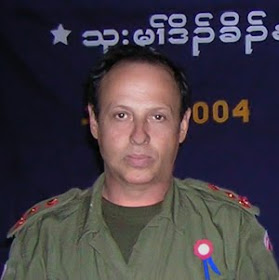Foreign-born Brig-Gen Saw Hsar Gay joined the Karen National Union (KNU) in 1989. Today he is the KNU’s deputy minister for foreign affairs, is a central committee member, and heads the Special Warfare Branch for the group's military wing, the Karen National Liberation Army (KNLA).

Saw Hsar Gay represented the KNU as its political representative for Portugal and Spain as far back as 1995. He has been received in more than 20 countries by prime ministers, foreign ministers and government delegations, and has served as a KNU representative within the National Coalition Government of the Union of Burma (NCGUB).
He spoke recently to The Irrawaddy senior reporter Saw Yan Naing.
Question: The KNU formed a “Committee for the Emergence of Peace” earlier this month after an emergency meeting of the central committee. Why?
Answer: The recent initiative to propose peace talks and subsequent meeting with U Aung Min created the necessity to prepare for laying down a politically coherent and coordinated body to deal with the practical, logistical and political necessities if a new bout of talks develop.
In the past, at times there was a certain dis-coordination and misunderstandings regarding the negotiations due to the fact that meetings and interviews were sometimes contradictory or less clear. Many people were getting involved without proper tasking and without understanding our policy, and this had to be rectified.
Q: What is the objective of the Committee for the Emergence of Peace? How many members does it have and who will lead it?
A: The committee is composed of seven members and is led by KNU Vice Chairman Saw David Thackerbaw. This committee is tasked with the coordination of the whole process and is not a delegation. It will coordinate and set down policy.
Q:We heard the KNU will hold peace talks with the Burmese government. Where and when will the talks take place? Did you receive any invitation from Naypyidaw?
A: on the 19th of this month we will have an informal meeting with U Aung Min, but it will be more to share intentions and clarify our political positions.
Q:How serious is the Burmese government this time? It has approached the KNU for peace talks several times.
A: We still see that it looks like the old divide-and-conquer tactics used in Khin Nyunt times. It looks as if it really is only based on the 2008 constitution, and the non-disintegration of the Union, as well as the non-disintegration of national unity, and the durability of sovereignty.
What started with a ceasefire was followed by economical development like logging, mining and contract farming without any political dialogue.
Q:What are the main issues the KNU will discuss with the government, and what are KNU’s expectations from the talks?
A: We believe that the solution of the county's problems will have to be solved through substantial and meaningful political dialogue on a national level and by all stakeholders, especially the ethnic nationalities. Therefore our position is clear: we feel that there must be a nationwide ceasefire so all stakeholders can freely meet and the political negotiations should be held through one body—the UNFC.
Our political principles remain the same as before: federalism, equality, self-determination. We believe that unilateral talks on a one-to-one basis are self-destructive. In fact, our position has not changed over the last years and is consistent with our constitution and Saw Ba U Gyi's principles.
Q: Democratic Karen Buddhist Army (DKBA) Brigade 5 has already signed a ceasefire agreement with the Burmese government. So, how is the relationship between the KNU and the DKBA?
A: We have always said that we are not the DKBA's enemy and we don’t want to fight them. We can talk to them informally whenever we want.
Second of all, I don’t see the DKBA as one monolithic bloc as it is not politically driven but rather driven by survival, trade and business. Therefore the attitudes of the different groups which control different areas are politically different. DKBA´s Brigade 5 under Brig-Gen Saw Lah Pwe has signed a ceasefire with the Burmese government, but it is based on tactical necessity and not of political conviction.
I believe we must not forget that he refused to be incorporated into the BGF [border guard force] in the first place and started fighting the Burmese army contrary to Maung Chit Htoo. So of course our relationship varies group to group and is determined often by location and even personal relationships. But this does not mean it is always institutional.
Q:The KNU has been fighting against the Burmese government for more than six decades. What the KNU want from the government? ... separatism or a federal state or anything else? And why?
A:We have made it clear that we want to exercise the right of self-determination and create a genuine Federal Union where all ethnic nationalities will enjoy equal rights. This is to be achieved through meaningful dialogue between all the stakeholders. And it is important that people understand that it is a process of voluntary association where the periphery gives some powers to the centre and not the other way around as it would be in the case of autonomy.
Through the right of self-determination we want to establish a genuine Federal Union without the unitary pyi ma concept of a Burman Mother State as was embodied in the 1947 constitution.
http://www.irrawaddy.org/article.php?art_id=22464&page=2

No comments:
Post a Comment